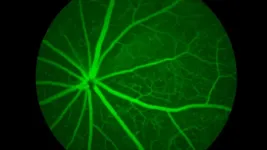(Press-News.org) A new psychological therapy designed by a team of UCL-led researchers has been found to reduce rates of violence and aggression among male offenders with antisocial personality disorder (ASPD).
The study, published in The Lancet Psychiatry and funded by the National Institute for Health and Care Research (NIHR), investigated whether aggression and antisocial behaviours could be improved by a modified form of mentalisation-based treatment (MBT).
Mentalisation-based treatment is a type of therapy that helps people to understand their own thoughts and feelings, as well as those of others.
The new treatment, known as MBT-ASPD, aims to enhance the ability of male offenders with ASPD to recognise and reflect on both their own and others' thoughts and feelings, helping to improve interpersonal interactions and decision-making.
Antisocial Personality Disorder is a mental health condition characterised by a persistent pattern of disregarding or violating the rights of others. Symptoms include deceitfulness, impulsivity, aggression, recklessness and a lack of remorse. It frequently involves criminality.
For the largest study of its kind, 157 male offenders on probation with ASPD in England and Wales received a 12-month course of MBT-ASPD alongside standard probation services. A control group of 156 participants received probation services without MBT-ASPD.
The treatment involved weekly 75-minute group therapy sessions led by two trained MBT clinicians, often supported by an expert by experience. The group enabled participants to explore social interactions including their personal values, observe how others thought about issues that concerned them, how their actions were seen by others and how their perceptions of themselves corresponded to others’ perceptions of them.
Participants also received monthly 50-minute individual therapy sessions. These sessions focused on developing mentalising skills (such as self-awareness, empathy for others, perspective taking and reflective thinking), particularly in situations of interpersonal conflict.
The results revealed that men who received MBT-ASPD had aggression levels approximately 50% lower than those in the standard probation services.
While both groups showed a decrease in ASPD symptoms, the MBT-ASPD group showed a significantly greater decrease of 63% in the number of symptoms at the 12 months follow-up.
Additionally, men in the MBT-ASPD group committed 46% fewer offences than those in the standard probation group over a three-year follow-up period.
Chief Investigator Professor Peter Fonagy (UCL Psychology & Language Sciences) said: “Given the enormous personal and societal costs of antisocial personality disorder – including higher risk-taking, poorer health outcomes, reduced employment, and an estimated £16.7 billion annual economic burden in the UK – this study represents a major breakthrough.
“Antisocial personality disorder has historically been difficult to treat, but our findings demonstrate that a psychological intervention requiring relatively limited therapist training can meaningfully improve outcomes for individuals with this condition while also reducing their impact on society.”
Despite previous mixed results from other psychological treatments such as Cognitive Behavioural Therapy (CBT), MBT-ASPD offers a promising new approach for male offenders. The study provides some of the strongest evidence to date that structured therapy can be effective in reducing aggression and criminal behaviours among individuals with ASPD.
Co-author and lead clinician Professor Anthony Bateman (UCL Psychology & Language Sciences) said: “This study suggests that clinicians can now be more optimistic about treating individuals with antisocial traits, who are often seen as untreatable and consequently face barriers in accessing both physical and mental health care.”
Encouraged by these findings, the research team is now calling for further studies to determine whether MBT-ASPD could be beneficial for a wider range of individuals, including those involved in serious violent behaviour, such as intimate partner violence.
Co-author Dr Elizabeth Allison (UCL Psychology & Language Sciences) said: “Traditional justice methods, such as imprisonment, have not been effective in reducing reoffending in cases of domestic abuse. Future research should explore how MBT-ASPD can be adapted for individuals involved in severe violence.
“Additionally, we need to assess how variations in treatment intensity and duration influence outcomes and whether the benefits of therapy are sustained over time.”
The study was carried out in collaboration with researchers at Anna Freud, Newcastle University, King’s College London, Royal Holloway, the National Probation Service London Division, University of Prince Edward Island, Bangor University, University of Nottingham and Imperial College London.
Study limitations
While the results are promising, the study had some limitations. The design made it challenging to isolate the specific effects of MBT-ASPD from the additional attention participants received.
Data collection issues and missing data – exacerbated by COVID-19-related delays – may also have impacted the findings.
Furthermore, since the study focused on male offenders aged 21 and older under probation supervision, the results may not be directly generalisable to other populations, such as younger offenders or those outside the probation system.
END
New therapy reduces reoffending in male offenders with antisocial personality disorder
Peer-reviewed | Experimental study | People
2025-02-19
ELSE PRESS RELEASES FROM THIS DATE:
We are no longer living longer, UEA study shows
2025-02-19
The rise in human life expectancy has slowed down across Europe since 2011, according to research from the University of East Anglia and partners.
A new study, published today in The Lancet Public Health, reveals that the food we eat, physical inactivity and obesity are largely to blame, as well as the Covid pandemic.
Of all the countries studied, England experienced the biggest slowdown in life expectancy.
It means that rather than looking forward to living longer than our parents or grandparents, ...
Study on new telerehabilitation stroke therapy model led by UTHealth Houston for underserved community in the Texas Rio Grande Valley
2025-02-18
A new at-home telerehabilitation care service for stroke patients will be offered to residents of Cameron County in the Rio Grande Valley as part of a randomized clinical trial led by researchers from across UTHealth Houston.
Investigators from UTHealth Houston School of Public Health in Brownsville, UTHealth Houston Institute for Stroke and Cerebrovascular Diseases, and McWilliams School of Biomedical Informatics at UTHealth Houston will create and test software delivered through a website to patients who have recently ...
Study reveals genes that may help predict prostate cancer outcomes
2025-02-18
A recent study published in the Journal of Cancer Research and Clinical Oncology explored genetic predictors of prostate cancer progression to help identify its clinical outcomes. Conducted by researchers from the D’Or Institute for Research and Education (IDOR), the University of São Paulo (USP), and the São Paulo Cancer Institute (ICESP), the study focused on the role of the androgen receptor (AR), its variant AR-V7, and the p160 gene family.
Prostate cancer: a complex and deadly disease
Prostate cancer is one of the leading causes of death among ...
Obesity surgery tourism – only approved centres should be carrying out recognised procedures to avoid further tragedies
2025-02-18
Obesity surgery (also known as bariatric and metabolic surgery) is one of the most common reasons for people to do so called ‘medical tourism’ – where they travel to another country to have the procedure carried out at usually a much lower price than in their home country. However, such procedures can sometimes be botched and lead to infections, temporary or permanent injuries and/or scarring, and in the worst cases, be fatal. Regarding Europe, there is currently no published data evaluating how to improve the safety of obesity surgery medical tourism.
Seeking this type of obesity ...
Medicaid telehealth reimbursement policies are exacerbating workforce shortages in safety net clinics, study finds
2025-02-18
A new study published in JAMA Network Open finds that low Medicaid telehealth reimbursement in New York State may be exacerbating a workforce crisis at Federally Qualified Health Centers (FQHCs), particularly among mental health care practitioners. The challenge compounds existing financial instability at FQHCs and barriers to telehealth access among low-income New Yorkers who rely on safety-net care.
The study, led by researchers at Columbia University Mailman School of Public Health, highlights several possible solutions, including payment parity ...
Texas McCombs faculty research hits historic high
2025-02-18
AUSTIN, Texas -- McCombs’ faculty research leaped 10 spots to No. 10 worldwide in the Financial Times’ release of its Global MBA Rankings for 2025, a historic high for McCombs reaching back to 1999.
The top spot for research went to the University of Pennsylvania, with Columbia University and the University of Chicago tying for second place.
Faculty Research is the third weightiest component (10%) of the 21 used in the MBA ranking, behind percentage of salary increase (16%) and salary three years post-graduation ...
Multiple sclerosis: Cell-catching implant helps identify successful treatment in mice
2025-02-18
Images
A sponge-like implant in mice helped guide a treatment that slowed or stopped a degenerative condition similar to multiple sclerosis in humans. It also gave University of Michigan researchers a first look at how primary progressive multiple sclerosis, the fastest-progressing version of the disease, attacks the central nervous system early on.
If administered early, the nanoparticle-based treatment prevented mice from developing symptoms such as paralysis. If given after the first symptoms emerged, it reduced symptom scores by half compared to untreated ...
Q&A: Is it always ‘us vs them’? Researcher explains why flexibility is key
2025-02-18
UNIVERSITY PARK , Pa. — Urban versus rural. Penn State versus Michigan. Star Wars versus Star Trek. As social beings, humans gravitate toward groups. But sometimes group living can spur an “us versus them” mentality that causes conflict, especially when two groups are competing for the same limited resources, like money or a championship trophy.
In the following Q&A, Anne Pisor, assistant professor of anthropology at Penn State and Social Science Research Institute co-funded faculty member, discussed her recently published paper on the “us versus them” mindset as well as the causes and how to overcome it.
Q: What does your research say about ...
New nanoscale technique unlocks quantum material secrets
2025-02-18
Scientists are racing to develop new materials for quantum technologies in computing and sensing for ultraprecise measurements. For these future technologies to transition from the laboratory to real-world applications, a much deeper understanding is needed of the behavior near surfaces, especially those at interfaces between materials.
Scientists at the U.S. Department of Energy’s (DOE) Argonne National Laboratory have unveiled a new technique that could help advance the development of quantum technology. Their innovation, surface-sensitive spintronic terahertz spectroscopy (SSTS), provides an unprecedented look at how quantum ...
New study uncovers how genes influence retinal aging and brain health
2025-02-18
Vision changes are an inevitable part of aging, but why are some more susceptible to age-related eye diseases and why do some individuals experience more severe decline than others? New research from The Jackson Laboratory (JAX) reveals that genetics play a key role in how the eye ages, with different genetic backgrounds influencing retinal aging in distinct ways.
The study, published in Molecular Neurodegeneration, examined age-related changes in genes and proteins of the retinas of nine strains of mice, ...
LAST 30 PRESS RELEASES:
ASU researchers to lead AAAS panel on water insecurity in the United States
ASU professor Anne Stone to present at AAAS Conference in Phoenix on ancient origins of modern disease
Proposals for exploring viruses and skin as the next experimental quantum frontiers share US$30,000 science award
ASU researchers showcase scalable tech solutions for older adults living alone with cognitive decline at AAAS 2026
Scientists identify smooth regional trends in fruit fly survival strategies
Antipathy toward snakes? Your parents likely talked you into that at an early age
Sylvester Cancer Tip Sheet for Feb. 2026
Online exposure to medical misinformation concentrated among older adults
Telehealth improves access to genetic services for adult survivors of childhood cancers
Outdated mortality benchmarks risk missing early signs of famine and delay recognizing mass starvation
Newly discovered bacterium converts carbon dioxide into chemicals using electricity
Flipping and reversing mini-proteins could improve disease treatment
Scientists reveal major hidden source of atmospheric nitrogen pollution in fragile lake basin
Biochar emerges as a powerful tool for soil carbon neutrality and climate mitigation
Tiny cell messengers show big promise for safer protein and gene delivery
AMS releases statement regarding the decision to rescind EPA’s 2009 Endangerment Finding
Parents’ alcohol and drug use influences their children’s consumption, research shows
Modular assembly of chiral nitrogen-bridged rings achieved by palladium-catalyzed diastereoselective and enantioselective cascade cyclization reactions
Promoting civic engagement
AMS Science Preview: Hurricane slowdown, school snow days
Deforestation in the Amazon raises the surface temperature by 3 °C during the dry season
Model more accurately maps the impact of frost on corn crops
How did humans develop sharp vision? Lab-grown retinas show likely answer
Sour grapes? Taste, experience of sour foods depends on individual consumer
At AAAS, professor Krystal Tsosie argues the future of science must be Indigenous-led
From the lab to the living room: Decoding Parkinson’s patients movements in the real world
Research advances in porous materials, as highlighted in the 2025 Nobel Prize in Chemistry
Sally C. Morton, executive vice president of ASU Knowledge Enterprise, presents a bold and practical framework for moving research from discovery to real-world impact
Biochemical parameters in patients with diabetic nephropathy versus individuals with diabetes alone, non-diabetic nephropathy, and healthy controls
Muscular strength and mortality in women ages 63 to 99
[Press-News.org] New therapy reduces reoffending in male offenders with antisocial personality disorderPeer-reviewed | Experimental study | People


